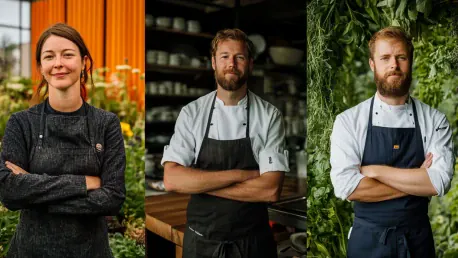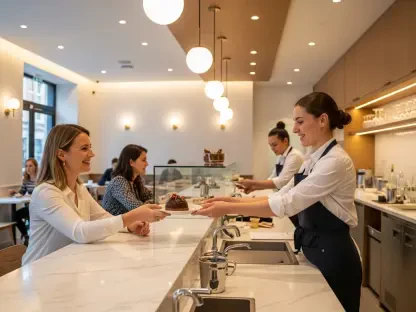Brighton’s restaurant scene is experiencing a significant shift towards sustainability, driven by a collaborative initiative between Restaurants Brighton, the University of Brighton, and the Brighton and Hove Food Partnership. This initiative has introduced a Sustainable Restaurant Guide to evaluate and award local dining establishments based on their commitment to eco-friendly and socially responsible practices. The guide aims to educate consumers and encourage restaurants to adopt sustainable practices, fostering a culture of environmental consciousness within the dining community. This collaborative effort reflects a growing trend where restaurants not only focus on delicious food but also take responsibility for their environmental impact.
The Sustainable Restaurant Guide
The Sustainable Restaurant Guide employs a badge system with three levels: Sustainability Explorer, Sustainability Leader, and Sustainability Champion. These levels reflect the extent to which a restaurant engages in five critical areas of sustainability: water usage, energy and gas supply, menu and food waste, waste reduction, and social sustainability. By recognizing and promoting eateries dedicated to reducing their environmental footprint, this initiative has successfully motivated local restaurants to adopt and enhance their sustainable practices.
The guide’s introduction has spurred local restaurants to adopt and enhance their sustainable practices. By highlighting successful examples, the guide serves as a valuable resource for other establishments looking to follow suit. The article explores two restaurants that have achieved Sustainability Champion status, providing insights into their sustainable practices and customer experiences. This approach not only rewards current efforts but also sets a benchmark for others in the industry to aspire to. The sustainability movement in Brighton’s restaurant scene thus gains momentum, driven by both recognition and the shared goal of a greener future.
Casazul: A Model of Zero-Waste
Casazul, a small, family-run restaurant offering authentic Mexican cuisine, exemplifies what it means to be a Sustainability Champion. Located at the London Road end of the Open Market, Casazul emphasizes zero-waste values and sources local meats and vegetables whenever possible. The menu features traditional ingredients and methods, such as mole made with over 40 ingredients, showcasing the richness and heritage of Mexican culinary traditions. Owner Gabriel is deeply committed to sustainability, carefully sourcing ingredients, avoiding additives, gluten, and GM products, and practicing attentive recycling. Despite the economic challenges, Gabriel believes that customers appreciate the high quality of the food and the environmental considerations, reaffirming the idea that sustainable practices and exceptional dining experiences can go hand in hand.
Gabriel’s engagement with customers about the importance of reducing carbon emissions reflects his broader commitment to sustainability. He acknowledges that the restaurant isn’t the cheapest in town but offers a unique, high-quality dining experience that combines delicious food with environmentally responsible practices. Casazul’s practices align with the broader goal of reducing carbon emissions in the food service industry, reflecting effective strategies such as minimizing waste, enhancing energy efficiency, using recyclable packaging, sourcing local and seasonal ingredients, educating customers on their choices, and promoting plant-based menus. Casazul exemplifies how restaurants can lead the way toward a more sustainable future while maintaining the integrity and authenticity of their culinary offerings.
Nanima Asian Kitchen Cafe: Energy Conservation and Waste Reduction
Nanima Asian Kitchen Cafe, another Sustainability Champion, focuses on minimizing waste, conserving energy, and promoting reusable packaging. Located in Kemptown, the cafe specializes in a mix of Asian cuisines and prepares unique dishes daily without a set menu to minimize waste. This approach not only ensures freshness but also reduces unnecessary food preparation, aligning with their zero-waste philosophy. Owners Lonnie and Nicky are committed to energy conservation, using smart energy meters and turning off equipment when not in use. They promote the use of reusable lunchboxes, offering a discount to customers who bring their own. The cafe’s vibrant ambiance enhances the overall dining experience, reflecting their dedication to sustainability while also creating an inviting atmosphere for patrons to enjoy a variety of Asian delicacies.
The dishes offered at Nanima, including chicken congee soup and shakshuka with Japanese stir fry, are prepared with care and consistency, adhering to sustainability standards. The owners’ commitment to energy conservation is evident in their operational practices, and their promotion of reusable packaging showcases a proactive approach to reducing environmental impact. By focusing on both culinary excellence and sustainable practices, Nanima Asian Kitchen Cafe exemplifies how restaurants can integrate modern sustainability principles without compromising on traditional culinary techniques. This balance of tradition and innovation highlights the dynamic potential of the food service industry to contribute positively to environmental conservation efforts.
Key Trends and Consensus
Both Casazul and Nanima Asian Kitchen Cafe showcase a robust commitment to sustainability, driven by the recognition that eco-friendly and socially responsible practices can coexist with high-quality dining experiences. They prioritize minimizing waste, conserving energy, and sourcing local and seasonal ingredients—strategies well-recognized as effective in reducing carbon emissions in the food service industry. These practices not only benefit the environment but also enhance the overall dining experience for customers, who increasingly value sustainability when choosing where to eat.
Customer engagement and education play crucial roles in their sustainability efforts. By informing customers about the environmental impact of their choices and promoting practices like the use of reusable packaging, these restaurants foster a culture of sustainability within their clientele. This educational aspect is essential for creating long-term change, as it empowers diners to make more environmentally conscious decisions. Furthermore, the economic challenges of maintaining sustainable practices are acknowledged, yet both Casazul and Nanima Asian Kitchen Cafe demonstrate that sustainability can be integrated into the restaurant business model without compromising the quality or authenticity of the culinary experience.
Overcoming Economic Challenges
Brighton’s restaurant scene is undergoing a notable transformation towards sustainability, spurred by a joint initiative from Restaurants Brighton, the University of Brighton, and the Brighton and Hove Food Partnership. This initiative has launched a Sustainable Restaurant Guide designed to evaluate and recognize local dining spots for their dedication to eco-friendly and socially responsible practices. The guide’s purpose is to educate consumers and motivate restaurants to embrace sustainable methods, thereby cultivating a culture of environmental awareness within the dining community. This collaborative effort mirrors a broader trend where restaurants focus not only on flavorful cuisine but also on their ecological footprint. By emphasizing greener practices, the local food scene in Brighton aims to set an example of how the dining industry can positively impact the planet while still delivering exceptional culinary experiences.









